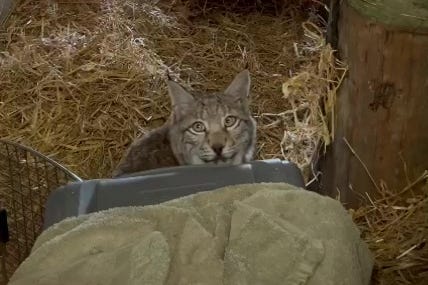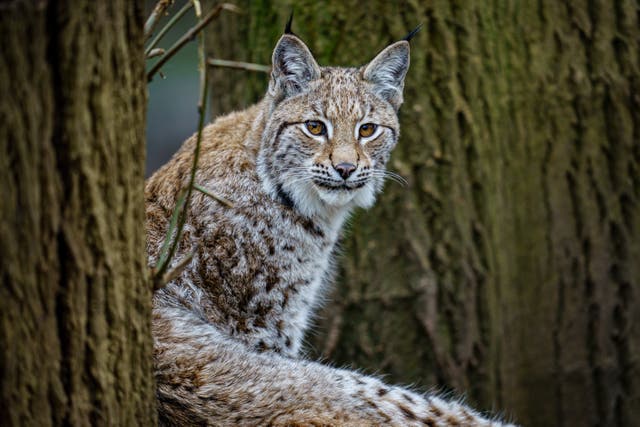Lynx released illegally into Highlands has died overnight, keepers say
The big cat was one of a second pair to be captured near the the Dell of Killiehuntly on Friday.

One of the illegally-released lynx captured in the Highlands has died, those caring for the animals have said.
The big cat was one of a second pair to be captured near the the Dell of Killiehuntly on Friday.
Police are searching for answers after the four animals were captured in the area in recent days, amid speculation “rogue rewilding” could be to blame for their release.
The lynx were baited into humane traps before being taken to the Highland Wildlife Park.
Dr Helen Senn, head of conservation at the Royal Zoological Society of Scotland (RZSS) said: “After extensive efforts to capture these animals safely and humanely, we were very sad to discover that one of them has died overnight.
“We do not yet know the circumstances behind its death but will be carrying out a post-mortem (examination) to try to establish what happened.
“Whatever the case, this unfortunate development just serves to further demonstrate the folly of abandoning these amazing animals in the wild, with no preparation or real concern for their welfare.
“We can only imagine the stress that all four of the recovered lynx must have experienced after being thrust into an entirely new and extremely harsh environment to fend for themselves.”
The surviving lynx from the latest pair is now being taken to Edinburgh Zoo to join the others for a period of quarantine.

On Saturday, The Scotsman reported that some conservationists believe a “frustrated activist” who wants to see the lynx returned to Scotland may be responsible for the release.
David Field, chief executive of RZSS, said the lynx is “wonderfully full of character” as an animal but should still be considered a wild cat.
He told BBC Radio 4’s Today programme: “Sadly there are rogue rewilders out there who bypass all the established international best practice and bypass all professional organisations which are discussing lynx coming back to Scotland.
“They are impatient and then proceed in a way which is this rebellious rogue rewilding. That’s really sad and that’s a real, real risk.”
He stressed it could also simply be the abandonment of animals which someone no longer wished to look after.
The RZSS has said the captured lynx are tame and are used to humans.

Lynx, which can be roughly the size of a Labrador, are usually shy and solitary creatures and attacks on humans are virtually unheard of.
Conservative MSP for the Highlands and Islands Edward Mountain said the second capture of lynx “would suggest a concerted approach to illegally reintroduce lynx”.
He said: “These animals cannot magically appear, and the authorities should be tackling this wildlife crime with an absolute focus of finding out who is responsible.”
Police Scotland said inquiries into how the lynx ended up in the area are continuing, and officers and wildlife experts will continue to examine the area where the animals were found.
In 2021 a group of charities launched a consultation on assessing people’s views about the potential of reintroducing Eurasian lynx to Scotland.
Steve Micklewright, chief executive of Trees for Life which is a member of the Lynx to Scotland partnership, said: “We await the post mortem results, but the tragic death of one of these beautiful, charismatic animals shows why illegal animal abandonment like this is so irresponsible and wrong.
“We hope the other three lynx are safe and well following the superb efforts of experts in trapping them so rapidly.
“This sorry saga is a reminder why an official future reintroduction of lynx to the Highlands must be properly managed with habitat assessments, public consultation, and a government licence.
“This would be a huge win for Scotland in the fight against extinction, and allow it to join other European nations in benefiting from the return of these stunning, shy animals which are a vital missing part of our ecosystems.”





